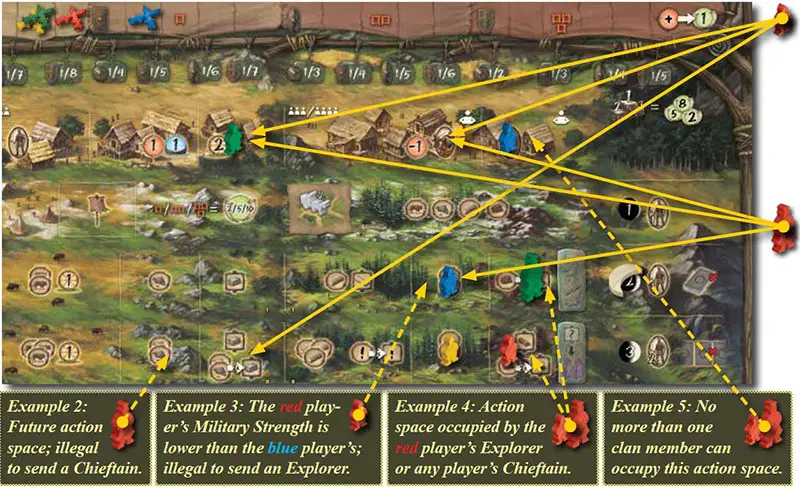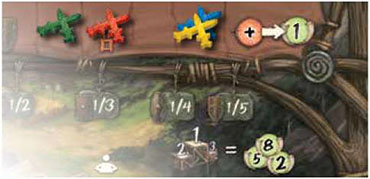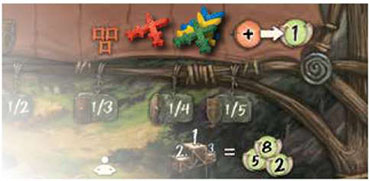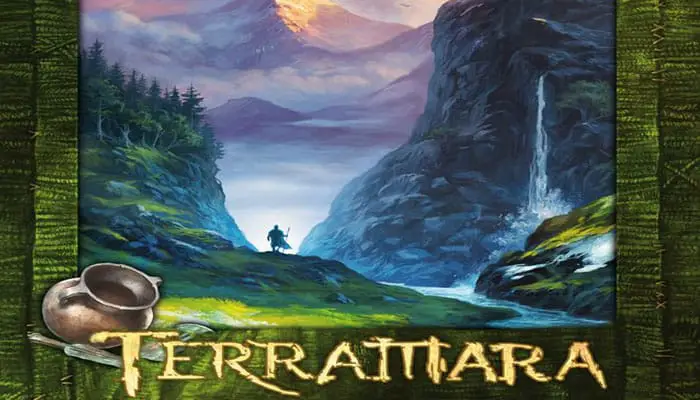
Terramara is the name given to a number of palafitte villages founded in northern Italy around 1,500 BC. The people who lived in Terramara were traders, and were known to have traveled frequently between the Alps and the river Po.
In Terramara, you'll play as the chieftain of a clan living in one of these villages. Your goal is to develop your clan by exploring far-away lands, improving your military, and visiting Outposts.
Components

- 16 Flags
- 4 Military token
- 4 Canoe
- 8 Caravans
- 4 Chieftains
- 24 Explorers
- 4 Hut cards
- Game board
- 4 Homeland tiles
- 24 Territory tiles
- 1 Round Marker
- 4 Warriors
- 1 Scorepad
- 17 Worker tiles
- 52 Artifact cards
- 1 First Player card
- 7 Character cards
- 18 Bonus tiles
- 12 Starting Resources cards
- 6 Fire tiles
- 4 Neutral Player cards
Object of the Game
To win, you'll have to expand your clan's reach and become skilled in battle.
Along the way, you will be able to discover technologies that will let you create new and useful artifacts. The player who builds the best clan will score the most Victory Points (VP) and become the leader of all Terramara.
Setup
-
Assemble the 8 puzzle pieces of the game board frame (icons face-up) and place it in the center of the table within easy reach of all players.
Give each player the following components in their chosen player colors:
- 1 Hut card, placed face-up on the table (game-end scoring is on the back of this card)
- 4 Flags
- Military token, placed on the first space of the Military track
- 2 Caravans, both placed on the uppermost space of the Road
- 1 Canoe, placed on the starting space of the River
- 1 Chieftain
- 5 Explorers, one of which is placed next to the River (the 6th Explorer in each player color is only used if a particular Character is selected, and in the 2- and 3-player setup)
-
Place the depicted Homeland tiles next to each other in the topmost slot of each column. The left tile should show a 4-player game icon and the right tile a 3- and 4- player game icon.
-
Sort the Forest/Mountain tiles by level. For each level, randomly select 2 tiles. Place these in the slots in the right column, going from top to bottom, starting with 2 level-1 tiles, then 2 level-2 tiles, and finally 2 level-3 tiles.
Make sure that their front sides, which show resource spaces but no snow, are face-up. Repeat this process for the Plains/Quarry tiles in the slots of the left column.
-
Place the Round Marker on the first space of the Rounds track.

-
Sort the Worker tiles by level, then place 2 Worker tiles on each space of the Rounds track, as follows: level-1 Workers, rounds 1 & 2; level-2 Workers, rounds 3 & 4; level-3 Workers, round 5.
-
Select a first player and give them the First Player card. Place it face-up on the table, but ignore its effects for now.
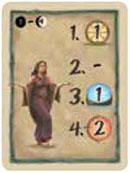
-
Sort the Bonus tiles face-down by level and place them randomly on the designated spots along the River, Road and the two level-3 Plains/Quarry tiles.
Then turn all Bonus tiles face-up. Leftover tiles may be used if a player chooses a specific Character at the start of the game.
-
Sort and shuffle the Artifact cards by level and create a face-down Artifact deck. Start with the level-3 cards at the bottom, put level-2 cards in the middle, and level- 1 cards on top.
Then draw the top 8 cards of the deck and place them from left to right below the game board in the designated slots along the River.
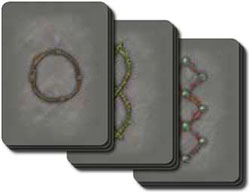
-
Put the Warriors next to the game board. The number of Warriors needed in your game will depend on which Territory tiles have been placed.

-
Place the Resource tiles and Victory Point tiles next to the game board, within easy reach of all players.

Game Elements
Resources
There are 4 types of resources in Terramara. Each resource tile has a raw side (round frame) and a refined one (square frame). Keep raw resources on the left of your Hut, and refined ones on the right. The following resources (raw - refined ) are available:
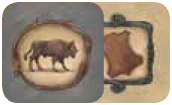 Livestock - Leather |
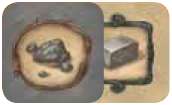 Stone - Ashlar |
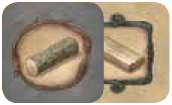 Wood - Lumber |
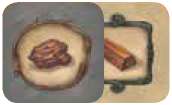 Ore - Metal |
Raw resources can never be used in place of refined ones. Refined resources may be used in place of their raw versions (i.e., you can use Metal instead of Ore, but you cannot use Ore instead of Metal).
Refined resources are needed to create Artifacts.
Workers
Workers allow players to refine raw resources. All Workers have a level: 1, 2, or 3. To activate a Worker, rotate that Worker's tile 90° to indicate that it has been used, then transform raw resources into their corresponding refined resources in a quantity up to the level of the Worker.
(i.e., a level-1 Worker can transform 1 raw resource to its refined version, while a level 3-Worker can transform 3 raw resources to their refined versions).
Each Worker tile can only be used once per round, at any time during your turn. Any excess capacity that is not used when the Worker is activated is lost for the round.
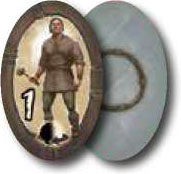 Level-1 (front & back) |
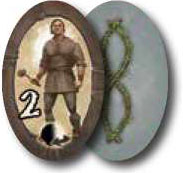 Level-2 (front & back) |
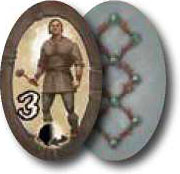 Level-3 (front & back) |
Artifacts
Artifacts are an excellent way to improve your clan's Culture, Travel, and Military Strength. They score significant amounts of VP at the end of the game, and may also provide you with special abilities.
There are 4 categories of Artifact cards, based on the main resource required to create them. These categories are Tools, Weaponry, Pottery, and Clothing.
Artifact cards are divided into three levels, mainly recognizable by their backside but also by their frame.
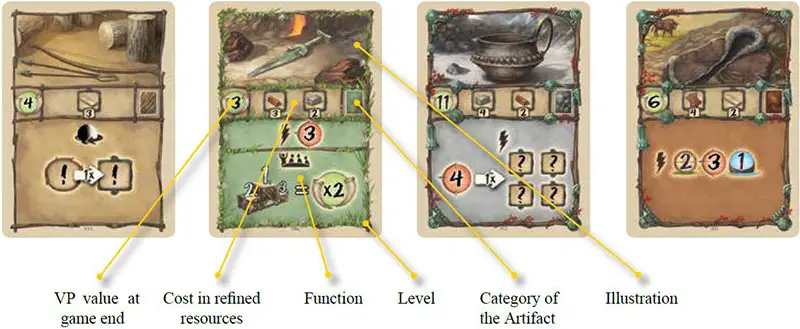
In addition to scoring VP at the end of the game, most Artifacts have also in-game effects. There are 4 types of effects, and each triggers at a different point during the game:
Permanent effects
 are active for the rest of the game; whenever its trigger condition is met, apply its effect.
are active for the rest of the game; whenever its trigger condition is met, apply its effect.Instantaneous effects
 are applied once, as soon as the Artifact has been created
are applied once, as soon as the Artifact has been createdOnce-per-round effects
 can be used at any time during a player's turn, but only once per round. Rotate the card 90° to indicate that its effect has been used.
can be used at any time during a player's turn, but only once per round. Rotate the card 90° to indicate that its effect has been used.Game-end effects
 score VP at the end of the game, as long as certain conditions have been met.
score VP at the end of the game, as long as certain conditions have been met.
Artifact effects are optional; players are never required to use them. Artifact effects do not have to be fully used (for example, if an Artifact awards 3 Travel, the player can choose to take 0, 1, 2, or 3 steps on the Road).
Beginning the Game
We recommend that you play your first game without Character and Starting Resources cards. Instead, give each player 1 each of the 4 different raw resources, 1 Level-1 Worker, and 1 Culture (place each player's Canoe on the first space of the River, instead of the starting space).
Set Military Strength according to player order: the first player gains 1 Military, the second gains 2, and so on.
Once all players know the game, we recommend selecting Characters and Starting Resources as follows: Randomly select and reveal a number of Character cards (with "young" side face-up) and Starting Resources cards each equal to one great- er than the number of players in the game.
Beginning with the last player in player order and proceeding counter-clockwise, each player chooses either a Character or a Starting Resources card.
Then, beginning with the first player in player order and proceeding clockwise, each player chooses a card of the other type, i.e. a player that chose a Character card at first, now chooses a Starting Resources card and vice versa. The Character card that remains unchosen, is returned to the box.
Then, beginning with the first player and going clockwise, players take the resources shown on their Starting Resources cards. In addition to raw and/or refined resources, this may include Workers, Military, Culture, Travel, and VP. Then, return all Starting Resources cards to the box.
Important: Bonuses provided by Character cards do not apply to Starting Resources cards.
Game Play
Terramara is played over 5 rounds. Each round starts with the first player and proceeds clockwise.
On each player's turn, that player must send out a single clan member (an Explorer or their Chieftain). Players' clan sizes can differ during the game, but a turn only ends after each player has sent out all of their clan members.
A clan member can be sent to a:
- Homeland action space
- Territory action space
- Crossroads action space
- Special action space, or
- your Hut
An action space may contain up to two clan members, but no more than one per color. If a Chieftain is on an action space, no other clan member may be sent there. Action spaces marked with this symbol  may only contain a single clan member.
may only contain a single clan member.

Explorers can be sent to any action space, but those on future Territories - on Territory tiles adjacent to rounds to come - will NOT be returned to players at the end of the round.
They will remain there until the end of the round in which those Territory tiles are flipped. Be aware that Explorers sent to Territories adjacent to round 5 will never return, since those tiles won't be flipped.
Wherever a single Explorer has been sent, another player can send their Chieftain or an Explorer. An Explorer can only be sent if that player's Military Strength is greater than that of the player already occupying that action space.
Sending an Explorer to an already-occupied action space makes you lose 1 Military. A player can do this even if losing Military would cause them to match the Military Strength of the player whose Explorer is already present on the action space.

Chieftains can NEVER be sent to future action spaces.
Example 1: It is the red player's turn in the 2nd round. Some of the action spaces where a clan member can be legally sent are indicated on the right side. Illegal placements are shown in the examples below.
After sending out a clan member and executing the associated action, you may either:
create 1 Artifact of your choice from those available to you along the River (see page 11); OR
create 1 Artifact you have previously reserved; OR
reserve 1 Artifact of your choice from tho se available to you along the River. Take that Artifact and place it face-down in front of you; no other player will be able to reserve or create that Artifact. At the end of the game, any player with a reserved Artifact will lose 5 VP.
Important: You may only reserve an Artifact once your Canoe has reached or passed the 4th space on the River, and you may not have more than one reserved Artifact. Artifacts along the River may still be created as normal.
A reserved Artifact cannot be discarded; it must be created before you can reserve another.
To create an Artifact, its resource cost must be paid to the general supply. The player then takes that Artifact and places it in front of them. As soon as an Artifact is created (not when it is reserved), the player immediately receives its benefits.
Whenever an Artifact is created or reserved, slide cards to the left if necessary and refill the River from the Artifact deck.
Homeland Action Spaces
The number of action spaces where players can send (place) clan members depends on how many players are in the game. There should always be one more action space than there are players.
-
4 players: the depicted 4-player tile placed on the left and 3/4-player tile on the right

-
3 players: the depicted 2/3-player tile on the left and the 3/4-player tile on the right

-
2 players: the depicted 2/3-player tile on the left and the 2-player tile on the right

The actions available in a 4-player game are explained below. These actions are also available in a 3-player game, but Develop your Skills and Travel the Road are grouped together - sending a clan member to that action space allows you to choose one of those actions.
In a 2-player game, Execute a Raid and Become First Player are also grouped together - both of these actions may be taken, in any order.
Hire a Worker: by sending a clan member to this action space, you may take 1 Worker tile; that worker's level depends on the current round. In rounds 1 & 2, the player receives a level-1 Worker. In rounds 3 & 4 a level-2 Worker, and in round 5, a level-3 Worker.
Develop your Skills: by sending a clan member to this action space, you gain 1 Military and 1 Culture.
Travel the Road: by sending a clan member to this action space, you gain 2 Travel. You may move each of your Caravans once, or a single Caravan up to two times.
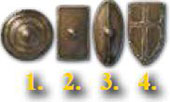
Execute a Raid: to send a clan member to this action space, you must immediately lose 1 Military. Then, all other players must give you resources according to their respective Military Strengths.
The Military track is split into 4 areas (Power Levels). Listed below the raider's Power Level is the number of resources each other player must pay (rounding down, as necessary).
Important: Only the difference in Power Level matters, and not exact Military Strength.
Players at the same level as the raider must give the raider 1 resource for every 5 they have.
Players 1, 2, or 3 levels lower than the raider must respectively give the raider 1 resource for every 4, 3, or 2 resources they have.
Players 1, 2 or 3 levels higher than the raider must respectively give the raider 1 resource for every 6, 7, or 8 resources they have.
Example: The raiding red player at Power Level 2 would receive 1 resource for every 5 resources owned by the blue player at the same Power Level, and 1 resource for every 4 resources owned by the weaker green player, at Power Level 1.
Both raw and refined resources are taken into account for these plunderings. Each player decides which of their resources to give to the raiding player; if a player has fewer resources than the threshold, they do not have to give any.
 This action space may only be claimed once per round.
This action space may only be claimed once per round.
Become First Player: by sending a clan member to this action space you take the First Player card, which will allow you to play first in the next round. You also immediately move one step along the road. The 2nd player in the new turn order gains no reward. If applicable, the 3rd player in new turn order immediately gains 1 Culture, and the 4th player gains 2 Military.
 This action space may only be claimed once per round.
This action space may only be claimed once per round.
At the start of the 5th (final) round of the game, flip the First Player card over. A player who sends a clan member to this action space in the final round gains their choice of 2 Travel, 2 Military, or 2 Culture; there is no effect on other players.
Territory Action Spaces
Each Territory tile contains 3 action spaces, divided by subtle lines. Small and large action spaces act in the same way. The difference in size for action spaces does only matter for setup in 2- and 3-player games.

Sending a clan member to a Territory action space immediately provides what is depicted on that action space.
In general this will be some combination of raw and refined resources, as well as allowing you to transform raw resources into refined ones. Some action spaces will gain you Military, Travel, Culture, or other effects.
Crossroads Action Spaces
Crossroads action spaces are depicted on the reverse of the level 1 & 2 Forest/Mountain tiles. They become available when the rightmost Territory tile of a row is flipped over at the end of a turn.
In the 2nd round, the Crossroads action space of the 1st round becomes available; in the 3rd round, the Crossroads action space of the 1st and 2nd rounds are available, and so on.
You can only send a clan member to a Crossroads action space if both of your Caravans have reached or passed the corresponding Crossroads, indicated by this symbol:
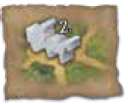
Special Action Spaces
The level-3 Forest/Mountain tiles provide special actions in the 5th round; no clan members can be sent to these spaces until the start of round 5. Players who meet the requirements listed below can send clan members to these spaces:
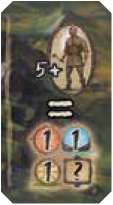
The levels of all your Workers sum up to at least 5.
Gain 1 Military, 1 Culture, and 1 Travel , and receive any 1 refined resource.

Reach or pass this symbol on the River.
Receive any 1 refined resource and score 3 VP.

Reach or pass this symbol on the Road with both of your Caravans.
Receive any 3 refined resources.

Reach or pass this symbol on the Military track.
Receive any 2 refined resources and transform 1 raw resource to its corresponding refined resource.
Your Hut
You can also send a clan member to your Hut. Your Hut may contain any number of clan members, including your Chieftain. For each clan member you send there, you can either:
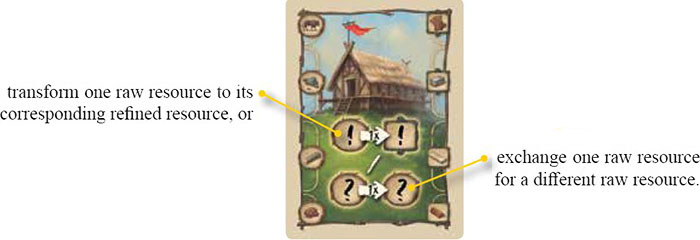
Start of Round
At the start of rounds 2-5, perform the steps described below. These steps are also depicted on the Rounds track.
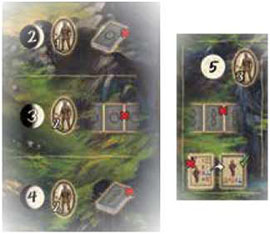
Round 2: Remove all level-1 Artifact cards from the Artifact deck.
Round 3: Remove all level-1 Artifact cards from the River, then refill.
Round 4: Remove all level-2 Artifact cards from the Artifact deck.
Round 5: Remove all level-2 Artifact cards from the River, then refill. Turn the First Player card over (first player doesn't change).
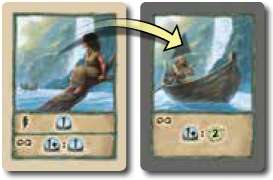
Before performing their first action in a round, a player may choose to flip their Character card over (from "young" to "experienced").
That player loses the bonuses of the front side and gains the bonuses of the backside. Each player can only do this once per game; this action is irreversible.
End of the Round
At the end of rounds 1-4, perform the following steps:
Return clan members on all action spaces to their owners, other than those placed on future action spaces.
Turn over the two Territory tiles adjacent to the Round Marker. This will reveal a Crossroads action space and an Outpost that can be visited from this point onwards.
Rotate all used Worker tiles and "once per round" Artifacts to their normal orientation; they are once again available to use . Move the Round Marker to the next space on the Rounds track.
Military
Each player has a Military token on the Military track, representing their Military Strength . When you gain Military, you may advance a number of spaces on this track up to the amount of strength gained. Some actions may cause you to lose Military; this will move your token backward on the track.

If you reach the end (20th space) of this track, you can advance no further; you will instead score 1 VP for each additional Military that you would have otherwise gained. You can still lose Military and be forced to move backwards on the track.
The track is split into 4 areas; the first space of each area shows a shield, indicating the Power Level of a player who has reached or passed that space.
Important: Military Strength differs from Power Level. Military Strength ranges from 0 to 20 and determines a player' s absolute strength, while a player's Power Level is indicated by shields representing levels 1-4. A player's Power Level determines how many resources they will receive from other players during a Raid.
At the end of the game, the player with the highest Military Strength will score 8 VP, and players with the two next-highest Military Strengths will respectively score 5 VP and 2 VP. In the case of a tie, all tied players score the appropriate amount of VP.
Depending on the number of tied players, the VP for the next position(s) may not be scored.
Example 1: The blue and yellow players each score 8 VP; the 5 VP for second position on the Military track will not be scored. Therefore, the red player scores 2 VP and the green player scores no VP.
Example 2: The blue, yellow and green players each score 8 VP. Neither the 5 VP for second position nor the 2 VP for third position will be scored. The red player scores no VP.
Road
Each player has two Caravans on the road. Whenever you gain Travel, you can move your Caravans a number of steps up to the number shown. A step means moving your Caravan to the next Crossroads, a bonus tile or an Outpost.
Since you take a detour when visiting a bonus tile or an Outpost, you require 2 steps in total to arrive at the next Crossroads.
Movement may be split between both Caravans. Caravans cannot be moved backwards on the Road. When one of your Caravans reaches or passes:
-
a bonus tile, you may apply the effect shown on that tile immediately.
-
an Outpost, leave one of your Flags there. At the end of the game, you score VP depending on how well you met that Outpost's requirements (see down below and on the next page). You can never leave multiple Flags on a single Outpost.
Note: Outposts become available at the end of each round when a level 1 or level 2 Territory tile is turned over. Before that time, you cannot travel over the road leading to the Outpost. In the cut-out to the left, Territory tiles from rounds, 1 to 3 are flipped over and their Outposts are available to visit your Caravan.
-
a Crossroads, there is no immediate effect. However, you must reach or pass a Crossroads with both of your Caravans in order to send a clan member to that row's Crossroads action space (see page 8 ).
-
The end of the road, park your Caravan in the highest-valued unoccupied bonus space; you will score that many VP at the end of the game.
The award is 8 V P for the first Caravan to reach the end of the Road 5 VP for the second and3 VP for every Caravan.
Note: These VPs are scored for each individual Caravan, so thereafter.
8 VP and 5 VP spaces can be scored by the same player if both of their Caravans reach the end of the road ahead of all other players.
Outposts
Outposts are depicted on the reverse side of the level 1 & 2 Plains/Quarry tiles. These become active when the leftmost Territory of a row is flipped over at the end of a round, and provide scoring opportunities upon being reached by one of your Caravans.
In the 2nd round, the Outpost of the 1st round becomes available. In the 3rd round, the Outposts of the 1st and 2nd rounds are available, and so on.
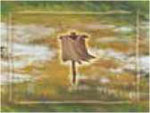
At the end of the game, you score VP according to how well you fulfilled the requirements of Outposts where you have left your Flag. Each Outpost shows an easy, medium, and hard requirement; these respectively score 2, 5, and 10 VP.
Overshooting the requirements scores you the VP of the highest requirement that you fulfilled. If you left your Flag on an Outpost but did not meet that requirement, you score 0 VP for that Outpost.
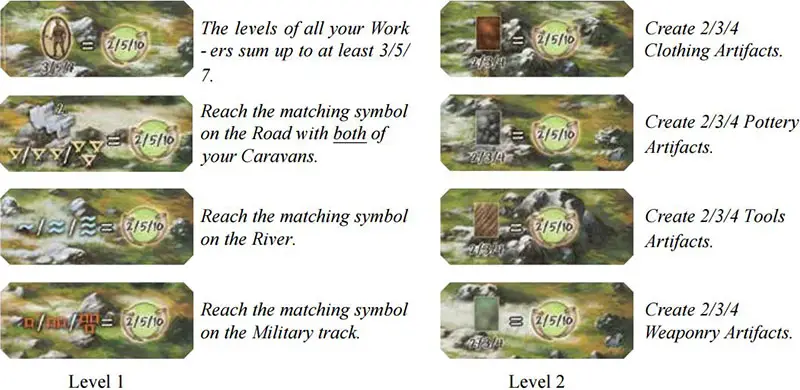
River
Improving your Culture provides more choices of Artifacts that you may create or reserve. When you gain Culture, you may advance a number of spaces on the River up to the amount of Culture gained.
Culture can never be lost; if you reach the end of the River (the 14th space), you will score 1 VP for each additional point of Culture you would have otherwise gained.
You can only create (or reserve, from space 4 onwards) Artifacts which you have passed or reached with your Canoe along the River. So if you have 0 Culture, you can only create the 2 leftmost Artifacts.
Upon reaching the 1st space, you can create the 3 leftmost Artifacts, with every 2 additional spaces allowing you to choose from an extra Artifact.
Some special actions/bonuses are available along the River. When you reach or pass:
Space 4, you may now reserve Artifacts (see page 6 for an explanation).
Space 6, you may apply the effect of the level-1 bonus tile.
Space 8, your clan gains an extra Explorer for the rest of the game.
Space 10, you may apply the effect of the level-2 bonus tile.
Space 12, you get a discount of any 1 resource when creating a reserved Artifact.
Space 14, you may apply the effects of the level-2 and level-3 bonus tiles.
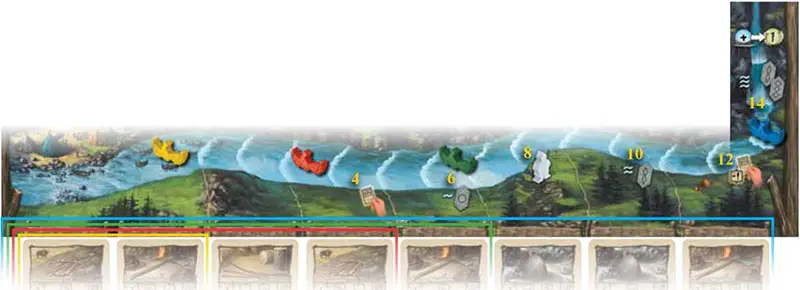
Bonus Tiles
There are 3 levels of bonus tiles. These are placed on designated spaces along the Road, next to the River, and on the leftmost area of a level 3 Plains/Quarry tile. Upon reaching a space that contains a bonus tile, you may apply its effect immediately and once only.
The tile stays in place and is still available to other players (and for the Road, your other Caravan). There is also a Character that provides bonus tiles, but these are personal. The effects of all bonus tiles are described on the next page, by level:



Warriors
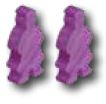
This symbol indicates that you may take 2 Warriors and put them in front of you.
During this round, you may use them as though they are members of your clan. Warriors act just like Chieftains, with one exception: you can send them to an action space occupied by your own Explorer.
The effects that refer to your Chieftain do not apply to Warriors. After this round, return these Warriors to the general supply.
Characters
Character cards are double-sided. The front of each Character card shows a boy or girl, along with the bonuses they provide during the game. The reverse of each card shows that same man or woman, grown-up; these provide ways to score VP.
Characters start the game on their "young" sides. At the beginning of each round, before sending out your first clan member, you may choose to flip your character over to their "experienced" side.
When you do, you lose all benefits from the "young" side. Doing so is irreversible; it cannot be undone.
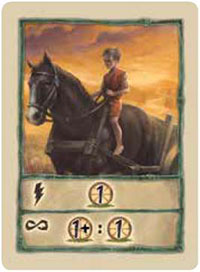
Immediately gain 1 Travel.
During the game, whenever you gain at least 1 Travel, gain 1 additional Travel.
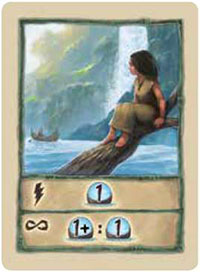
Immediately gain 1 Culture.
During the game, whenever you gain at least 1 Culture, gain 1 additional Culture.
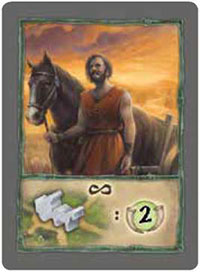
Whenever one of your Caravans reaches or passes a Crossroads, score 2 VP.
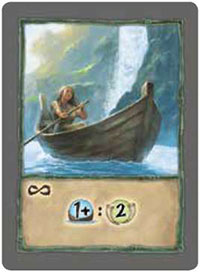
Whenever you gain at least 1 Culture, score 2 VP.
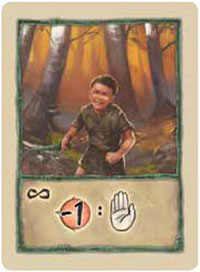
You don't lose Military. This doesn't apply to cards or action spaces that allow you to exchange Military.
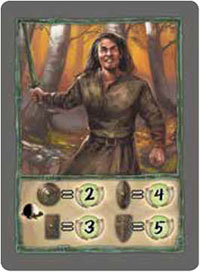
Once per round during your turn, score VP according to your Power Level.
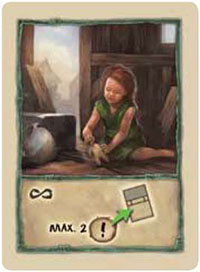
Whenever you create an Artifact, you may use up to 2 corresponding raw resources in place of refined.
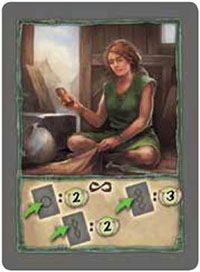
Whenever you create a level-1 or level-2 Artifact, score 2 VP. Whenever you create a level-3 Artifact, score 3 VP.
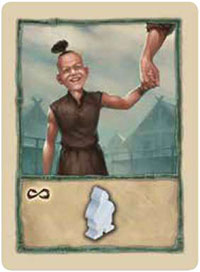
Your clan gains an extra Explorer.
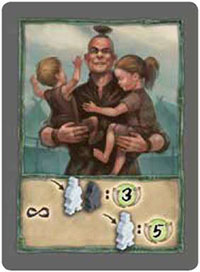
Note: By flipping this Character over, you lose your extra Explorer. This cannot be one that was sent to a future Territory. Whenever you send your Chieftain to an action space occupied by another player's Explorer, score 3 VP.
Whenever you send your Chieftain to unoccupied action space, score 5 VP.
Upon selecting this Character, take all leftover bonus tiles. Put them face-up in front of you as a personal supply of one-time-use bonus tiles.
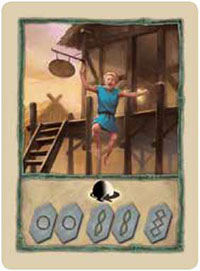
Once per round during your turn, you may use 1 personal bonus tile. In the first round, you may only use a level-1 bonus tile. In the 2nd round, you may either use a level-1 or level-2 bonus tile.
From the 3rd round, you may use anyone's personal bonus tile. Return a personal bonus tile to the box after use.
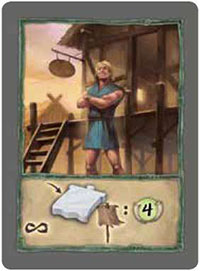
Note: By flipping this Character over, you lose your remaining personal bonus tiles.
Whenever you leave your Flag on an Outpost, score 4 VP.
Upon selecting this Character, take 1 leftover level-1 Forest/Mountain tile and 1 leftover level-1 Plains/Quarry tile of your choice, and place them in front of you, face-down.
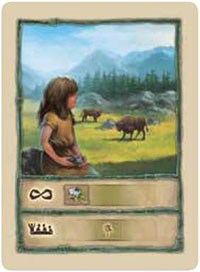
You can send your clan members to this personal Crossroads action space, regardless of your Caravans' positions.
At the end of the game, score VP according to how well you fulfilled the requirements of this Outpost.
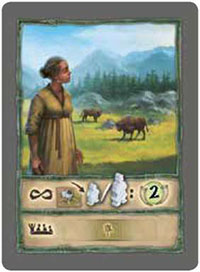
Note: By flipping this Character over, you lose your personal Crossroads action space.
Whenever you send an Explorer or your Chieftain to any Crossroads action space, score 2 VP.
At the end of the game score VP according to how well you fulfilled the requirements of this Outpost
Game End Scoring
The game will end at the completion of the 5th round, and the player with the most VP will be named High Chieftain of Terramara. Use the scorepad to write down the VP that players have earned in each category.
In the event of a tie, the tied player who advanced furthest on the River is the winner. If there is still a tie, the tied player with the most Military Strength is the winner. If there is still a tie after that, the tied players enjoy a shared victory!
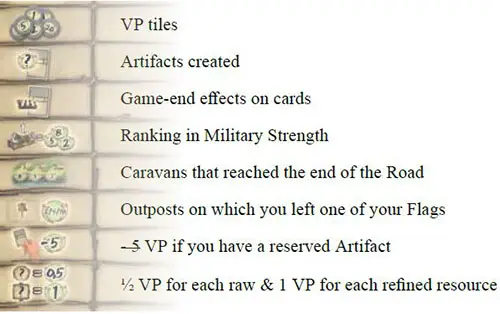
Continue Reading
